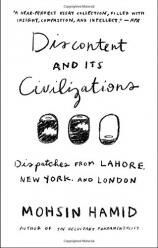Discontent and Its Civilizations: Dispatches from Lahore, New York, and London
Review
Discontent and Its Civilizations: Dispatches from Lahore, New York, and London
In the opening essay of his new collection, Mohsin Hamid narrates how he moved from Pakistan to America as a three-year-old, only to return to his country of birth six years later, having forgotten his Urdu. The essay concludes with this meditation on his experience of going back to Pakistan:
Sometimes, as a nine-year-old twice transported, the words I heard moved me in unexpected ways, like impressions of half-forgotten sunny afternoons, less than memories and therefore impossible to share.
I wonder now if that is partly why I write, to try.
Coming where it does, right at the beginning of the book, the statement invites us to read it as a kind of thesis statement. It’s an appealing idea, writing as an attempt to recover the irrevocable, an enterprise doomed to failure, and therefore heroic. It is also a model of writing that goes against the grain of what we expect from essays, with their clear lines of argument and carefully formulated conclusions. I was excited by the idea of reading something more impressionistic, a book of essays whose meanings tended towards elusiveness. It is partly for this reason that I was disappointed with DISCONTENT AND ITS CIVILIZATIONS.
"The book is divided into three sections: life, art and politics. The essays that best adhere to the ideals of writing outlined above are, somewhat unsurprisingly, found in that first section. The pieces are by turns wistful, angry and very funny."
The book is divided into three sections: life, art and politics. The essays that best adhere to the ideals of writing outlined above are, somewhat unsurprisingly, found in that first section. The pieces are by turns wistful, angry and very funny. At the best moments, they are all three at once, such as this encounter with a Muslim cab driver in New York:
My driver looks like a terrorist: steady eyes, thick beard, the reserved watchfulness of the devout. A verse of the Koran dangles beneath his rearview. He could have been my uncle.
Here, and throughout the first third of the book, the essays venture into real time, vividly rendered scenes --- and, as such, they feel like fragmentary pieces of an unwritten novel.
By comparison, the section on Art is lackluster. In “Where is the Great American Novel by a Woman,” for instance, Hamid’s central point is that there is no single Great American Novel, and that the concept is not just a fallacy, but a potentially harmful one. His contention, while no doubt true, is so obvious as to be hardly worth saying. Writing about his own fiction, he is more illuminating. As with his more personal essays, they become most interesting when looking at the intersection between the writer’s life and his art, such as in his discussion of the second person in literature growing out of the fantasy games of his childhood, in particular Dungeons and Dragons.
The final section, on politics, feels curiously misplaced in this book. Again, as ever, Hamid writes well. He is also clearly impassioned writing about Pakistani nationalism, for instance, or the death of Osama bin Laden. The pieces themselves, however, are necessarily topical. And while there is something to be said for reading an occasional piece of writing years after the occasion that provoked it has passed, the topicality of these essays puts them at odds with the more timeless pieces earlier in the book, on fatherhood, say, or learning to be an artist.
Almost every piece in the book has something to commend it, but they come together to form an awkward whole. Perhaps I would be more forgiving of such a strangely put together collage were this an end-of-career roundup of uncollected essays. But such a slim volume coming out so early in a writer’s life seems like a cynical way to earn a few pennies until his next novel is ready for publication.
Reviewed by Frederick Lloyd on February 27, 2015
Discontent and Its Civilizations: Dispatches from Lahore, New York, and London
- Publication Date: February 2, 2016
- Genres: Essays, Nonfiction
- Paperback: 256 pages
- Publisher: Riverhead Books
- ISBN-10: 1594634033
- ISBN-13: 9781594634031





